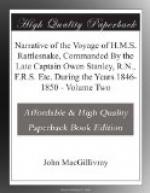Yesterday at noon we passed close to Beauchene Island, a dreary, bushless place, half covered with snow. Vast numbers of pintados were about, also some albatrosses, the first that had made their appearance for several weeks back. In hopes of reaching an anchorage before dark we stood in for Bull Road, East Falkland Island, but after running fourteen miles, and sighting Sealion Islands, this was found impracticable. The ship was kept away to the eastward, and, after wearing several times during the night to avoid closing the land, a course was shaped to take us to the settlement. Passing inside of the Seal Rocks we rounded Cape Pembroke, on which is a tall beacon, and anchored at dark inside the entrance to Port William.
July 9th.
The thermometer fell to 18 degrees during the night, and the water froze on the decks during the holystoning. A cold dreary aspect was presented when the sun rose upon the snow-clad country around, but the sight of a herd of cattle on shore conjured up visions of fresh beef and made ample amends. We beat up Port William, and, passing by a narrow channel from the outer to the inner harbour, or Port Stanley, anchored off the settlement. We found a solitary vessel lying here—an English brig bound to California.
The settlement of Stanley was formed in July, 1844, by the removal thither of the former establishment at Port Louis—Port William being considered preferable as a harbour, besides being easier of access and more conveniently situated for vessels calling there for supplies. The inner harbour, which communicates with the outer one by a passage not more than 300 yards wide, is four and a half miles in length by half a mile in width, with anchorage everywhere. The township extends along the centre of the south shore, as a small straggling village of wooden houses, the uncompleted residence of the Lieutenant-Governor being the only one built of stone. The population, I was told, is about 300: of these thirty are pensioned soldiers, many of whom with their families are temporarily lodged in a large barrack, which curiosity one day led me to visit. Its inmates are all Irish, and appeared to be in anything but comfortable circumstances, although such as work as labourers receive three shillings per diem, and mechanics are paid in proportion. One of them, who had served in Van Diemen’s Land, said he often envies the lot of a convict there, for “sure we are fretting to death to think that we have come to this in our old age after serving our king and country so long.” They all bitterly complained of having been deluded at home by highly-coloured reports of the productiveness of a country where grain will not ripen, and which has not yet been found capable of producing a tolerable potato. Of the remainder of the place little can be said. There are two good stores where we procured nearly everything we wanted at very moderate prices: beef of very fair quality is sold at 2 pence per pound, wild geese at 1 shilling 3 pence each, and rabbits at four shillings a dozen. The only vegetables, however, were some small Swedish turnips, which we got by favour. Lastly, a ship may obtain water here with great facility from a small reservoir from which a pipe leads it down to the boat.




